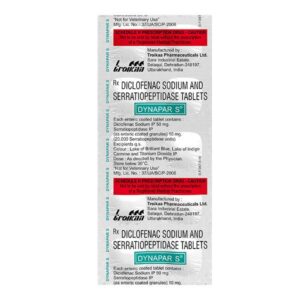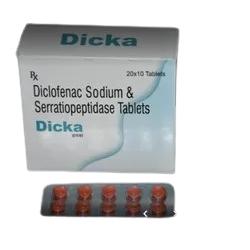DICLOFENAC + SERRATIOPEPTIDASE
Diclofenac: Diclofenac is a nonsteroidal anti-inflammatory drug (NSAID) that is commonly used for the treatment of pain and inflammation. It is available in various forms, including tablets, capsules, gels, and injections.
Diclofenac works by inhibiting the production of prostaglandins, which are substances in the body that promote inflammation, pain, and fever. By reducing the levels of prostaglandins, diclofenac helps to alleviate pain and reduce inflammation.
This drug is prescribed for a range of conditions, including arthritis (osteoarthritis, rheumatoid arthritis), gout, menstrual cramps, and post-operative pain. It can also be used for other types of pain, such as sprains, strains, and back pain.
The appropriate dosage of diclofenac depends on the form and strength of the medication, as well as the patient’s condition. It is typically taken orally with food to minimize stomach upset. The exact dosage should be determined by a healthcare provider based on the specific needs of the patient.
Common side effects of diclofenac include stomach upset, diarrhea, gas, dizziness, and headache. In rare cases, more serious side effects can occur, such as high blood pressure, fluid retention, heart problems, liver or kidney damage, and allergic reactions. Long-term use of high doses of diclofenac can also increase the risk of gastrointestinal bleeding and ulcers.
It is important to note that diclofenac should not be used by individuals who are allergic to NSAIDs or have a history of allergic reactions to aspirin or other NSAIDs. It may also interact with certain medications, so it is essential to inform your healthcare provider about all other drugs you are taking.
As with any medication, it is crucial to follow the prescribed dose and duration of treatment and report any side effects or concerns to a healthcare professional.
Serratiopeptidase: Serratiopeptidase is a medication that belongs to the group of enzymes called proteolytic enzymes. It is derived from bacteria called Serratia marcescens.
The main use of Serratiopeptidase is to reduce inflammation and pain. It is commonly prescribed for conditions such as arthritis, sinusitis, bronchitis, and other inflammatory conditions. It works by breaking down proteins in the body that contribute to inflammation, thereby reducing pain, swelling, and other symptoms.
The recommended dose of Serratiopeptidase can vary depending on the condition being treated. Typically, the initial dose for adults is around 10 to 30 milligrams per day, taken orally. However, it is important to follow the specific instructions provided by the prescribing healthcare provider.
While Serratiopeptidase is generally considered safe, it may cause some side effects. Common side effects include gastrointestinal issues such as nausea, vomiting, diarrhea, and stomach pain. Some individuals may also experience allergic reactions, such as rash, itching, or swelling. Rarely, more severe allergic reactions may occur, including difficulty breathing or swelling of the throat, face, or tongue. If any of these serious side effects occur, immediate medical attention should be sought.
It is important to note that Serratiopeptidase may interact with certain medications, such as blood thinners, so it is crucial to inform the healthcare provider about all current medications before starting treatment with this drug. Additionally, it is not recommended for use during pregnancy or breastfeeding unless specifically instructed by a healthcare professional.



